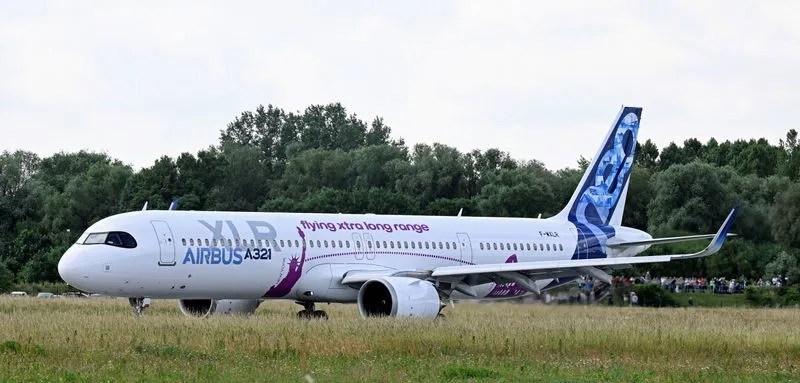Airbus has reached a monumental milestone by delivering the inaugural A321XLR aircraft to Spain's Iberia, intensifying its rivalry with Boeing in the mid-range jet sector. The arrival of this innovative aircraft, designed to fill the void left by Boeing's obsolete 757 model, underscores Airbus' commitment to enhancing aviation performance standards.
Airbus Unveils First A321XLR: Elevating Aircraft Competition Against Boeing


-
Airbus Unveils First A321XLR: Elevating Aircraft Competition Against Boeing
Airbus has made a significant stride in the fiercely contested aviation space by delivering its inaugural A321XLR aircraft to Spain's Iberia, marking a decisive move in its ongoing rivalry with Boeing within the mid-range jet sector. The five-year development journey culminated in the delivery of this groundbreaking plane, designed to cater to a market segment previously dominated by Boeing's obsolete 757 model or larger wide-body aircraft.
This milestone moment, documented by Flightradar24 data indicating the aircraft's impending journey to Madrid, underscores Airbus and Boeing's relentless pursuit to enhance the performance benchmarks of the aviation industry's most sought-after single-aisle aircraft. Launched in 2019 as a strategic maneuver to outpace Boeing's then-anticipated launch of a new aircraft in the mid-range category, the A321XLR sets its sights on filling the void left by the disused Boeing 757, with the A321 family already establishing supremacy over the larger variants of the 737 MAX in market preference.
Distinguished as the industry's largest single-aisle jet, the A321XLR boasts cutting-edge fuel technology, encompassing a distinctive fuel tank seamlessly integrated into the fuselage contours to optimize fuel storage capacity and bolster its transatlantic range. Nonetheless, the unconventional design initially sparked regulatory concerns regarding fire risks and emergency evacuation protocols in case of mishaps, necessitating meticulous design enhancements to secure certification.
Although the augmented weight resulting from these modifications marginally impacted the aircraft's maximum range, Airbus maintains that the approximately 200-seat configuration will enable airlines to unlock a myriad of new flight routes, enhancing operational flexibility and market reach. Embarking on a transformative journey, Iberia intends to deploy the A321XLR on routes linking Madrid to Boston following a series of trial flights across Europe, marking a significant leap in the airline's operational repertoire.
With over 500 A321XLR orders secured and slated for delivery in the foreseeable future, Airbus' strategic foresight and ambitious vision reflect the protracted lead times prevalent within the aviation industry, necessitating meticulous planning and execution to fulfill client demands and market expectations.
Implications for Boeing and Industry Dynamics
Boeing has contended that the A321XLR primarily caters to a limited niche within the expansive single-aisle aircraft market, estimated at 33,380 units over the upcoming two decades. Skepticism surrounding the aircraft's range capabilities and operating costs has been raised, with concerns regarding potential strains on aircraft and engine performance necessitating enhanced maintenance protocols.
Amidst Airbus' delivery triumph, the onus is now on Boeing to expedite certification processes for its behemoth single-aisle aircraft, the 737 MAX 10, following regulatory delays stemming from an anti-ice system issue. Boeing's commitment to compliance and adherence to certification timelines remains under scrutiny, highlighting the intensifying competition between Airbus and Boeing as they vie for market dominance and client trust in an evolving aviation landscape.
Iberia's strategic adoption of the A321XLR aligns with its eco-friendly aspirations and industry-wide sustainability targets, pledging to eliminate net CO2 emissions by the year 2050. The upcoming celebratory event on November 6 heralding the aircraft's debut signifies a pivotal juncture for Iberia, illustrating the airline's steadfast commitment to environmental stewardship and operational efficiency.
The aviation sector's resolute drive towards sustainability is epitomized by the A321XLR's deployment of advanced engines boasting significant fuel efficiency gains. Equipped with LEAP engines from CFM International, a joint venture between GE Aerospace and Safran, the aircraft embodies the industry's collective endeavor to embrace greener technologies and mitigate environmental impact. Pratt & Whitney, a subsidiary of RTX, also offers cutting-edge engine options for the A321XLR, heralding a new era of eco-conscious aviation practices and technological innovation.
As the aviation industry charts a course towards sustainability and operational excellence, the delivery of the A321XLR to Iberia symbolizes a paradigm shift in aircraft design and performance, setting the stage for heightened competition, technological advancement, and environmental responsibility within the global aviation landscape.
-

 বাংলা
বাংলা  Spanish
Spanish  Arabic
Arabic  French
French  Chinese
Chinese 